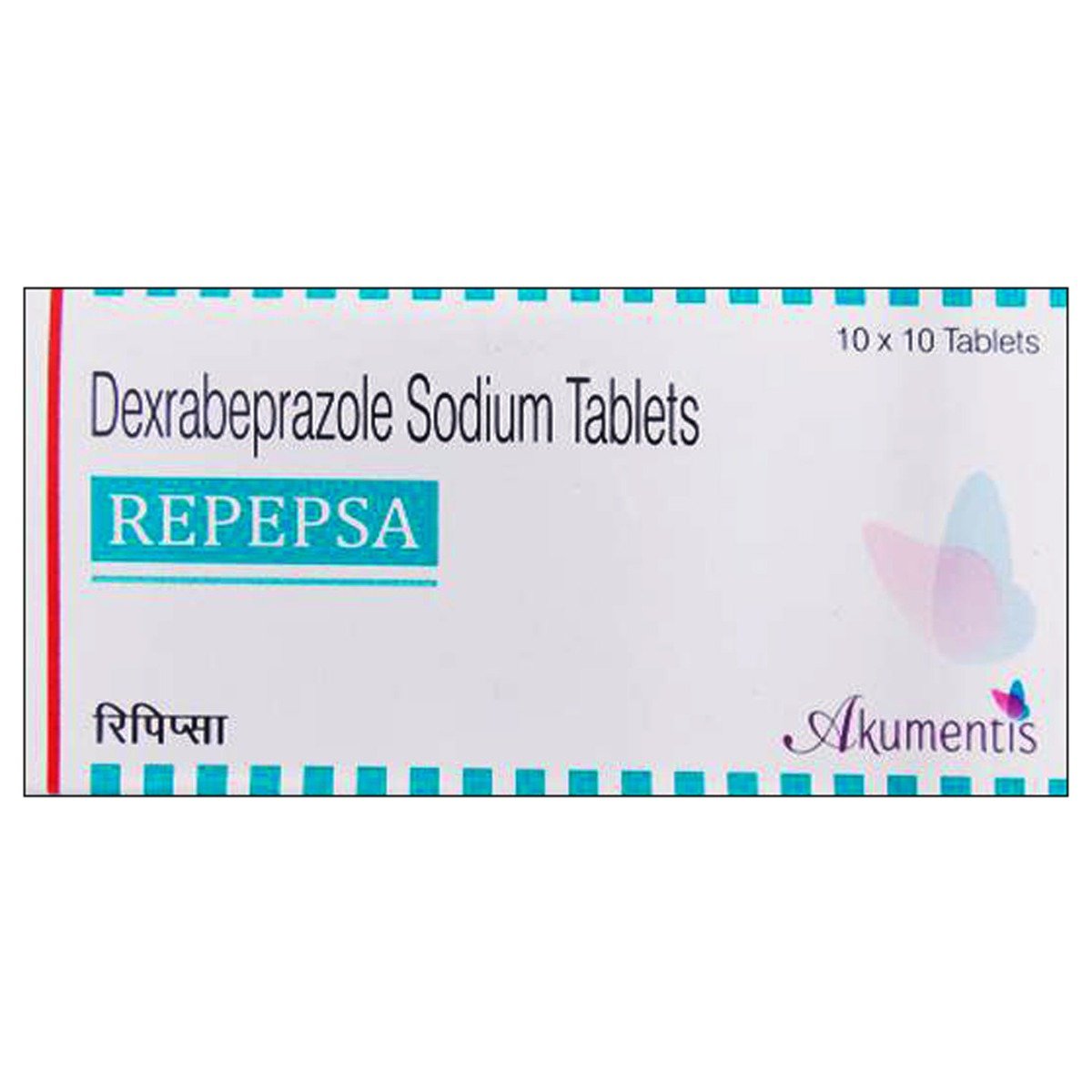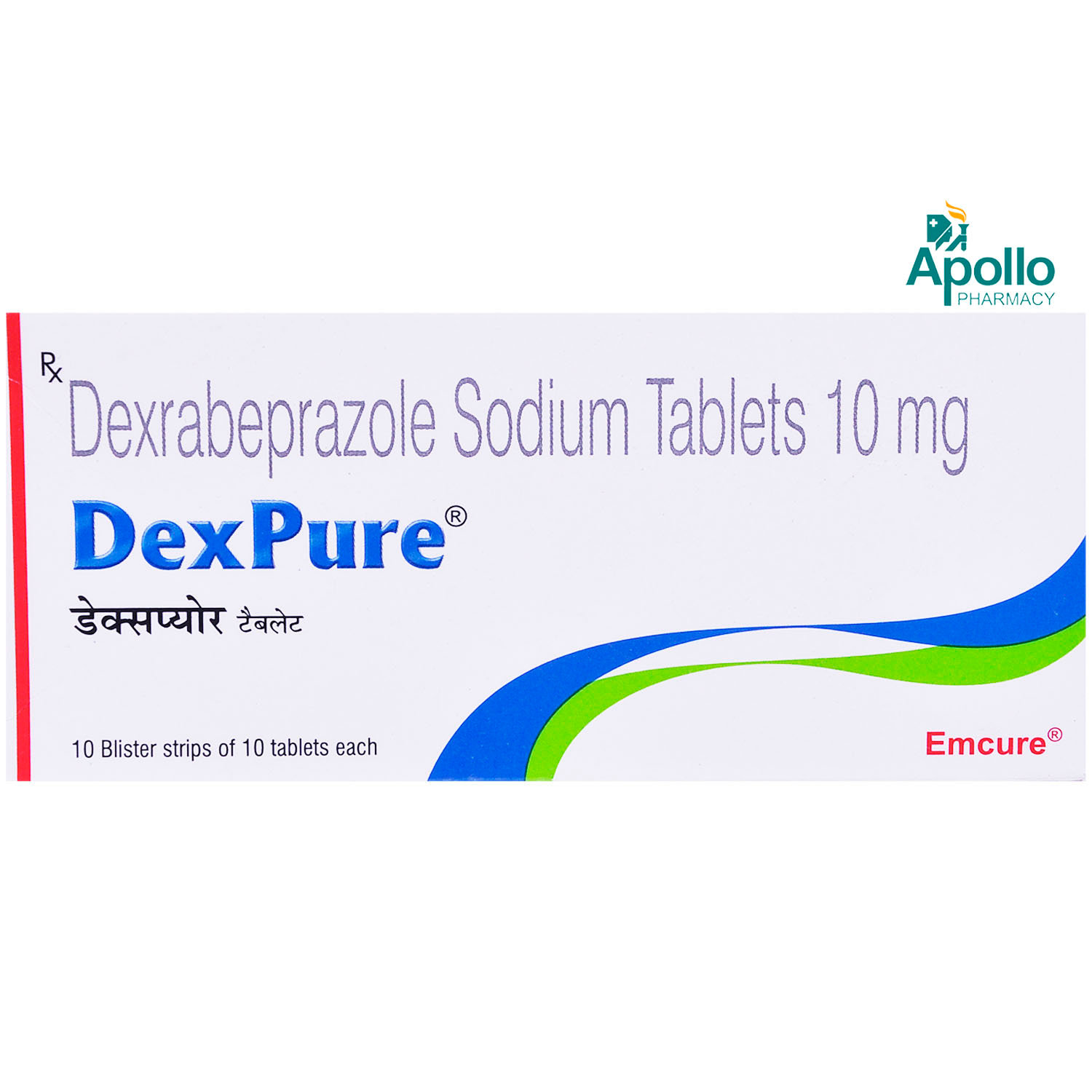- Home
- Dirab 10 mg Tablet
Dirab 10 mg Tablet Substitute
Dirab 10 mg Tablet Substitute
Medicine Composition:
DEXRABEPRAZOLE-10MGAll Substitutes & Brand Comparisons
RX
Dexol Tablet 10's
Gkm New Pharma
₹65
(₹5.85 per unit)
85% COSTLIERRX
Out of StockRepepsa Tablet 10's
Akumentis Healthcare Ltd
₹69
(₹6.21 per unit)
97% COSTLIERRX
Out of StockRozydex 10mg Tablet
Zodak Healthcare Pvt Ltd
₹84
(₹7.56 per unit)
140% COSTLIERRX
Out of StockDesprazole Tablet 10's
Medihealth Lifesciences India Pvt Ltd
₹82
(₹8.2 per unit)
160% COSTLIERRX
Dexlet 10 Tablet 10's
Prisure Medicare
₹91.5
(₹8.24 per unit)
161% COSTLIERRX
Out of StockDexpure 10 mg Tablet 10's
Emcure Pharmaceuticals Ltd
₹103.3
(₹9.3 per unit)
195% COSTLIERRX
Out of StockDex Rabato 10mg Tablet 10's
Zentiva Pvt Ltd
₹145
(₹13.05 per unit)
314% COSTLIERRX
Dexarab 10 mg Tablet 10's
Emcure Pharmaceuticals Ltd
₹163
(₹14.67 per unit)
365% COSTLIER

When Should You Consider Switching from Dirab 10 mg Tablet ?
Patients may explore substitutes in the following scenarios:
- High monthly cost of Dirab 10 mg Tablet
- Non-availability in local pharmacies
- Generic recommendation by a doctor
- Side effects or better tolerability with alternatives
What to Know Before Switching
Before you switch from Dirab 10 mg Tablet to another medicine, here are some important points to keep in mind:
Same salt, different brands:
Most substitutes contain the same active ingredient - DEXRABEPRAZOLE-10MG, but the fillers, coating, or manufacturing quality may vary slightly.
Consult your doctor first:
Even if the salt is the same, your doctor can confirm if the substitute is right for your condition, dosage, and health history.
Watch out for allergies or reactions:
Some people may react differently to certain brands due to inactive ingredients. If you notice any side effects, inform your doctor immediately.
Price ≠ effectiveness:
A lower-priced substitute doesn't mean it's less effective. Many generic medicines work just as well as branded ones.
Check the dosage form and strength:
Always match the substitute’s strength (e.g., 5mg, 10mg) and form (tablet, capsule, syrup) with what your doctor prescribed.
Uses
Dirab 10 mg Tablet is used in the treatment of gastroesophageal reflux disease (GERD), peptic ulcers, and Zollinger-Ellison syndrome. The detailed uses of Dirab 10 mg Tablet are as follows:
- Treats acid reflux (GERD): Dirab 10 mg Tablet helps to relieve symptoms of GERD such as heartburn, acid regurgitation, and chest discomfort by reducing excess stomach acid.
- Heals peptic ulcers: Dirab 10 mg Tablet helps to heal sores in the stomach or upper part of the intestine. It prevents them from coming back.
- Controls excess acid production: Dirab 10 mg Tablet is used to treat conditions like Zollinger-Ellison syndrome, where the stomach produces too much acid.
Medicinal Benefits
Dirab 10 mg Tablet contains Dexrabeprazole used to treat gastroesophageal reflux disease (GERD), peptic ulcers, and Zollinger-Ellison syndrome. Dirab 10 mg Tablet blocks the action of proton pumps that are involved in producing stomach acid. Thereby, Dirab 10 mg Tablet reduces the amount of acid produced by the stomach and prevents excess acid from flowing back into the food pipe. Thus, it provides relief from heartburn symptoms related to acid reflux. Also, Dirab 10 mg Tablet may be used in combination with clarithromycin and amoxicillin (antibiotics) to eradicate Helicobacter pylori (a type of bacteria) from the stomach in patients with peptic ulcers.
FAQs
The substitutes of Dirab 10 mg Tablet contain the same active salt(s) - DEXRABEPRAZOLE-10MG. However, they may differ in price, manufacturing quality, and inactive ingredients. Speak to your doctor to find a suitable option.
Switching to a generic substitute medicine in the place of Dirab 10 mg Tablet is often possible if it has the same salt, strength, and dosage form. But always check with your doctor before making any changes to your medication.
Generics versions of Dirab 10 mg Tablet are typically more affordable because they don’t include the original brand's research, development, and marketing costs. They contain the same active ingredient and are approved for safety and effectiveness.
Most people don’t notice any difference. However, some may react to different fillers or coatings. If you notice any unusual symptoms after switching, consult your doctor.
Make sure the new medicine has the same active salt, strength, dosage form. Always confirm the change with your doctor or pharmacist.
Substitutes of Dirab 10 mg Tablet meet the same safety and efficacy standards as Dirab 10 mg Tablet , but small differences in absorption or formulation can exist. A doctor can help you choose the right one for your needs.
Yes. Substitutes of Dirab 10 mg Tablet may vary in color, size, or shape due to differences in manufacturing and branding, but this does not affect how they work.
Yes, it’s generally safe to switch between multiple substitutes of Dirab 10 mg Tablet if they have the same salt and strength. However, always inform your doctor so they can monitor how your body responds.
Yes, many people safely use substitutes of Dirab 10 mg Tablet for long-term treatment. Just ensure it’s done under medical supervision.
If your symptoms stay under control or lab results remain stable, the substitute for Dirab 10 mg Tablet is likely working well. Regular follow-ups with your doctor are important.
Absolutely. Even with the same salt, small differences can affect how your body responds when switching from Dirab 10 mg Tablet to its substitute. Always consult your doctor before switching.
Dirab 10 mg Tablet is used to treat gastroesophageal reflux disease (GERD), peptic ulcers and Zollinger-Ellison syndrome.
Dirab 10 mg Tablet contains Dexrabeprazole that works by blocking the action of proton pumps that are involved in producing stomach acid. Thereby, Dirab 10 mg Tablet reduces the amount of acid produced by stomach and prevents excess acid flowing back into foodpipe. Thus, provides relief from heartburn symptoms related to acid reflux.
Dirab 10 mg Tablet may cause diarrhoea as a common side effect. However, if the condition persists or worsens with fever, watery or bloody stools or consistent stomach pain, please consult a doctor. Also, drink plenty of water while taking Dirab 10 mg Tablet to prevent dehydration.
Dirab 10 mg Tablet may cause low levels of magnesium in the blood if taken for more than 3 months. If you experience involuntary muscle contractions, tiredness, fits, increased heart rate or dizziness while taking Dirab 10 mg Tablet , please consult a doctor immediately as these might be signs of low magnesium levels. However, regular blood tests are recommended to monitor magnesium levels in the blood while taking Dirab 10 mg Tablet .
You are not recommended to take Dirab 10 mg Tablet with antifungals such as ketoconazole or itraconazole as it may reduce the effectiveness of antifungal against fungal infections. However, please consult your doctor before taking Dirab 10 mg Tablet with other medicines.
Dirab 10 mg Tablet should be used with caution in osteoporosis (weak and brittle bones) patients as it may worsen the condition especially if Dirab 10 mg Tablet is taken for more than 1 year as it increases the risk of fracture of spine, hip or wrist. Therefore, inform your doctor if have osteoporosis or if you are taking any steroids which may increase the risk of osteoporosis.
Dirab 10 mg Tablet may reduce the absorption of vitamin B12 and lead to its deficiency if used for more than 3 years. Therefore, inform your doctor if you have any risk factors for reduced vitamin B12 before taking Dirab 10 mg Tablet .
Dirab 10 mg Tablet is generally safe when used for the duration prescribed by your doctor. However, using it for more than a year or longer may increase the risk of side effects, such as bone fractures, low magnesium levels, vitamin B12 deficiency, and fundic gland polyps (growths in your stomach lining).
Long-term use of Dirab 10 mg Tablet may lead to nutrient deficiencies, particularly in magnesium, calcium, and vitamin B12, due to reduced absorption. This may also increase the risk of bone fractures because of lower calcium levels. Therefore, it is important to follow your doctor's instructions when using Dirab 10 mg Tablet , especially for extended periods.
It is generally not recommended to drink alcohol while taking Dirab 10 mg Tablet , as alcohol can irritate your stomach lining and may reduce the effectiveness of the medication in treating acid-related conditions.
Yes, you can take Dirab 10 mg Tablet (a proton pump inhibitor) with antacids if your doctor advises it. Dirab 10 mg Tablet works best when your stomach is less acidic, and antacids can change the acidity in your stomach. To avoid any possible interference, it is advisable to maintain a gap of 2 hours between Dirab 10 mg Tablet and antacid medicines.
It is important to follow your doctor's advice about when to stop taking Dirab 10 mg Tablet . Even if symptoms have improved, stopping the medication too soon may cause symptoms to return.
Dirab 10 mg Tablet usually starts working within an hour of taking it. You may begin to feel better within 2 to 3 days, but it can take up to 4 weeks for your symptoms to fully improve.
The common side effects of Dirab 10 mg Tablet include diarrhoea, nausea, vomiting, headache, dizziness, stomach pain, and constipation. Most of these side effects of Dirab 10 mg Tablet do not require medical attention and gradually resolve over time. However, if the side effects persist or worsen, please consult your doctor.
Buy best Gastro Enterology products by
Abbott India Ltd
Sun Pharmaceutical Industries Ltd
Cipla Ltd
Alkem Laboratories Ltd
Mankind Pharma Pvt Ltd
Intas Pharmaceuticals Ltd
Torrent Pharmaceuticals Ltd
Lupin Ltd
Dr Reddy's Laboratories Ltd
Leeford Healthcare Ltd
Aristo Pharmaceuticals Pvt Ltd
La Renon Healthcare Pvt Ltd
Macleods Pharmaceuticals Ltd
Wallace Pharmaceuticals Pvt Ltd
Alembic Pharmaceuticals Ltd
J B Chemicals & Pharmaceuticals Ltd
Zydus Healthcare Ltd
Morepen Laboratories Ltd
Micro Labs Ltd
Zuventus Healthcare Ltd
Zydus Cadila
FDC Ltd
Fourrts India Laboratories Pvt Ltd
Alniche Life Sciences Pvt Ltd
Tas Med India Pvt Ltd
Cadila Pharmaceuticals Ltd
Eris Life Sciences Ltd
Medishri Healthcare Pvt Ltd
Medley Pharmaceuticals Ltd
Signova Pharma
Sanatra Healthcare Ltd
Elder Pharmaceuticals Ltd
Tablets India Ltd
East West Pharma India Pvt Ltd
Ajanta Pharma Ltd
Vasu Organics Pvt Ltd
Wockhardt Ltd
Emcure Pharmaceuticals Ltd
Akumentis Healthcare Ltd
Glenmark Pharmaceuticals Ltd
Blue Cross Laboratories Pvt Ltd
Biological E Ltd
Cadila Healthcare Ltd
Corona Remedies Pvt Ltd
Medgen Drugs And Laboratories Pvt Ltd
Primus Remedies Pvt Ltd
Hetero Drugs Ltd
Indoco Remedies Ltd
Ipca Laboratories Ltd
Pfizer Ltd
Systopic Laboratories Pvt Ltd
DR Johns Lab Pharma Pvt Ltd
Ozone Pharmaceuticals Ltd
Prevego Healthcare & Research Pvt Ltd
Albert David Ltd
Knoll Healthcare Pvt Ltd
Biochem Pharmaceutical Industries Ltd
Indchemie Health Specialities Pvt Ltd
Lincoln Pharmaceuticals Ltd
Ordain Health Care Global Pvt Ltd
Troikaa Pharmaceuticals Ltd
Eskag Pharma Pvt Ltd
Olcare Laboratories Pvt Ltd
Samarth Life Sciences Pvt Ltd
Shine Pharmaceuticals Ltd
Shreya Life Sciences Pvt Ltd
Foregen Healthcare Ltd
Hetero Healthcare Pvt Ltd
Intra Life Pvt Ltd
Adonis Laboratories Pvt Ltd
Capital Pharma
Chemo Healthcare Pvt Ltd
Sanzyme Pvt Ltd
Yuventis Pharmaceuticals
3M India Ltd
Alienist Pharmaceutical Pvt Ltd
Meridian Enterprises Pvt Ltd
Meyer Organics Pvt Ltd
Sinsan Pharmaceuticals Pvt Ltd
Steris Healthcare
Levin Life Sciences Pvt Ltd
Medwock Pharmaceuticals Pvt Ltd
Msn Laboratories Pvt Ltd
Overseas Health Care Pvt Ltd
RPG Life Sciences Ltd
Dey's Medical Stores (Mfg) Ltd
German Remedies Ltd
Obsurge Biotech Ltd
Panacea Biotec Ltd
Saf Fermion Ltd
Sargas Life Sciences Pvt Ltd
Seagull Pharmaceutical Pvt Ltd
USV Pvt Ltd
Aar Ess Remedies Pvt Ltd
Comed Chemicals Ltd
Galpha Laboratories Ltd
Icarus Health Care Pvt Ltd
Indiabulls Pharmaceuticals Pvt Ltd
Megma Healthcare Pvt Ltd
Rapross Pharmaceuticals Pvt Ltd





